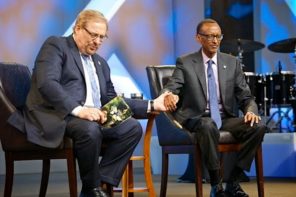UPDATE 12/12/13: According to Andy Crouch, Docent has records proving that Driscoll was provided “all the documentation needed to properly cite the IVP commentary” he’s accused of copying.
***
It’s been nearly three weeks since hipster fundamentalist and Mars Hill Pastor Mark Driscoll was accused of having plagiarized passages of his recent book A Call to Resurgence during an interview with Christian Radio Host Janet Mefferd. According to a plagiarism expert, some of the passages in question were “copied almost verbatim,” and it was “exceptionally unlikely” that this was a coincidence.
Perhaps the most egregious similarity was between a book called the New Bible Commentary and Driscoll’s “study guide” Trial: 8 Witnesses from 1 & 2 Peter, which takes its name from a sermon series Driscoll gave in 2009. (The practice of turning sermons into hastily-assembled books is common at Mars Hill—see “Pastor Dad.”)
Now, blogger Warren Thockmorton has dug up evidence that may shine a light on how the alleged plagiarism of New Bible Commentary occurred. The two-paragraph passages, which can be viewed here, are identical with just a few exceptions:
- A slight change of syntax: “The Greek rather than the Hebrew version of the OT” becomes “The Greek version of the old testament, rather than the Hebrew version.”
- Three words are changed out for synonyms.
- “would have grown up with the language” is changed to “grew up with the language.”
- “which” is replaced with “that.”
This was clearly either plagiarism or supernaturally bad luck.
On Tuesday, Thockmorton discovered a primitive version of Trial on Driscoll’s website called the “battle plan” for his sermon series. In this document, the memo that leads to the alleged plagiarism appears—completely raw, still including the header “From: Justin Holcomb.” Holcomb, who works for pastoral research assistance company Docent Research, included the section in question in his memo without any indication that the words were not his. [see UPDATE above—eds]
When the “battle plan” became a “study guide” for Driscoll’s sermon series whoever designed the guide (Driscoll takes the credit, but that doesn’t mean it’s him) simply copied Holcomb’s words and made the few changes. So it looks as though Driscoll copied Holcomb—without citing him—unaware that he was actually citing New Bible Commentary.
This revelation is particularly damning in light of Driscoll’s recent bragging about his ability to write all his sermons in an hour and to research from “a few hundred books” at once—a claim of near-superhuman research and writing capabilities that says something about Driscoll’s theology. As a pastor, Driscoll is deeply invested in his own “authenticity,” his from-the-heart spontaneity that often leads to bizarre and problematic interpretations of Bible passages. This is because, in the minds of Driscoll’s followers, his directness, looseness, spontaneity, and lack of polish makes him more honest, drawing him away from theologically abstraction and allowing him to engage more directly with God’s truth. He’s a “straight talker.”
Now that this illusion has been shattered, the Driscoll brand may be permanently damaged.




